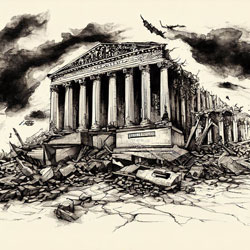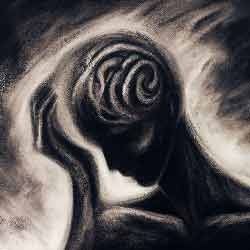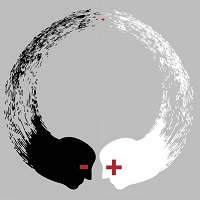 The relationship between journalism and Trump has been a contentious one since he first entered the political arena. Trump has repeatedly attacked the media, calling it "the enemy of the people" and accusing it of spreading "fake news." He has also refused to cooperate with journalists, often refusing to answer their questions or even acknowledging their presence.
The relationship between journalism and Trump has been a contentious one since he first entered the political arena. Trump has repeatedly attacked the media, calling it "the enemy of the people" and accusing it of spreading "fake news." He has also refused to cooperate with journalists, often refusing to answer their questions or even acknowledging their presence.
 In this tumultuous epoch of political discord, a strange and insidious malady has taken hold of our collective consciousness. It is a spectral shadow, a haunting apparition that lingers in the minds of many. It has been given a name - "Trump Exhaustion." This ominous term is used to describe a peculiar kind of mental fatigue, a weary lassitude induced by the incessant barrage of news, controversies, and vitriolic rhetoric associated with the figure of former President Donald Trump.
In this tumultuous epoch of political discord, a strange and insidious malady has taken hold of our collective consciousness. It is a spectral shadow, a haunting apparition that lingers in the minds of many. It has been given a name - "Trump Exhaustion." This ominous term is used to describe a peculiar kind of mental fatigue, a weary lassitude induced by the incessant barrage of news, controversies, and vitriolic rhetoric associated with the figure of former President Donald Trump.
 When the hallowed halls of the Supreme Court echo not with the sound of justice, but with the whispers of doubt and mistrust, we are all lessened. We are all dimmed when the beacon of our nation's justice system, the esteemed Supreme Court, is tinged with a loss of credibility.
When the hallowed halls of the Supreme Court echo not with the sound of justice, but with the whispers of doubt and mistrust, we are all lessened. We are all dimmed when the beacon of our nation's justice system, the esteemed Supreme Court, is tinged with a loss of credibility.
The court that has, for generations, stood as a symbol of fairness, of equality, of justice, cannot afford to lose the trust of the people. For it is not merely the court that stands to lose, it is the very fabric of our democracy.
 There is a bittersweet understanding in the heart of society, a tacit agreement, that the rule of law is the bedrock of order, the linchpin of justice, the very essence of freedom. Yet, when this unspoken pact is fragmented, when the rule of law is cast aside, society, like a river losing its banks, spills into an unfamiliar territory, a place where liberty becomes an elusive concept and justice a phantom of its former self.
There is a bittersweet understanding in the heart of society, a tacit agreement, that the rule of law is the bedrock of order, the linchpin of justice, the very essence of freedom. Yet, when this unspoken pact is fragmented, when the rule of law is cast aside, society, like a river losing its banks, spills into an unfamiliar territory, a place where liberty becomes an elusive concept and justice a phantom of its former self.
 In the solemn realm of remembrance, I gather my opinions to pay homage to a figure who once stood tall and respected amongst us; yet now, I believe, has fallen into the chasm of obnoxious transgressions. Once revered, now repulsed; once loved, now loathed; I trace the arc of this being's existence, from glory to ignominy, with a heavy heart and a mourning soul. This reflective discourse is a personal journey through the shifting sands of admiration for a public figure once held in high esteem. This composition is not a rallying cry to change minds, nor a clandestine attempt to tarnish reputations. It is but an honest reflection, an exploration of sentiments altered.
In the solemn realm of remembrance, I gather my opinions to pay homage to a figure who once stood tall and respected amongst us; yet now, I believe, has fallen into the chasm of obnoxious transgressions. Once revered, now repulsed; once loved, now loathed; I trace the arc of this being's existence, from glory to ignominy, with a heavy heart and a mourning soul. This reflective discourse is a personal journey through the shifting sands of admiration for a public figure once held in high esteem. This composition is not a rallying cry to change minds, nor a clandestine attempt to tarnish reputations. It is but an honest reflection, an exploration of sentiments altered.
 In the delicate tapestry of human experience, we must look beyond our borders to understand the weight of the gun violence that burdens our great nation. A sorrowful song weaves itself across the world, yet our own land echoes with a thunderous cacophony of pain and loss. The United States, a land of dreams and promise, finds itself entangled in a storm of gun violence that far surpasses the struggles faced by other developed countries.
In the delicate tapestry of human experience, we must look beyond our borders to understand the weight of the gun violence that burdens our great nation. A sorrowful song weaves itself across the world, yet our own land echoes with a thunderous cacophony of pain and loss. The United States, a land of dreams and promise, finds itself entangled in a storm of gun violence that far surpasses the struggles faced by other developed countries.
 In our sun-drenched land, a nation that births dreams and sets souls alight with passions and aspirations, there exists a specter, a haunting presence that casts its shadow over the lives of the innocent. A menace that steals the breath of mothers, fathers, sons, and daughters, whose very whispers tremble in the air, reverberating the chilling sound of gunfire. This specter is the plague of gun violence, an affliction that has seeped into the very marrow of the United States, leaving scars upon our collective memory.
In our sun-drenched land, a nation that births dreams and sets souls alight with passions and aspirations, there exists a specter, a haunting presence that casts its shadow over the lives of the innocent. A menace that steals the breath of mothers, fathers, sons, and daughters, whose very whispers tremble in the air, reverberating the chilling sound of gunfire. This specter is the plague of gun violence, an affliction that has seeped into the very marrow of the United States, leaving scars upon our collective memory.
 In that eldritch year, when the shadows of a delayed release hung over the doomed town of Redfall, the anticipation and disquietude intermingled like the mist in the night air. The fateful hour was postponed from the Summer of 2022 to the eerie month of September, Anno Domini 2023. Amidst the whispers of trepidation, the acolytes of Arkane Austin laboured to forge their most ambitious creation hitherto, a game that would transcend the boundaries of their previous incantations, such as Prey and Dishonored.
In that eldritch year, when the shadows of a delayed release hung over the doomed town of Redfall, the anticipation and disquietude intermingled like the mist in the night air. The fateful hour was postponed from the Summer of 2022 to the eerie month of September, Anno Domini 2023. Amidst the whispers of trepidation, the acolytes of Arkane Austin laboured to forge their most ambitious creation hitherto, a game that would transcend the boundaries of their previous incantations, such as Prey and Dishonored.

In the dim and foreboding annals of human strife, a sinister and ongoing war inflicted upon a proud and noble Ukrainian people by the festering pustulant of suffering, President Putin. This dire conflict, known as the Russo-Ukrainian War, has plagued the hapless nations of Ukraine and Russia since the morrow of February 2014. The tumultuous strife followed the cataclysmic events of the Ukrainian Revolution of Dignity. Russia and its malignant tendrils reached out to envelop the fates of both Crimea and the shadowy realm of the Donbas, territories whose allegiance is claimed by the beleaguered Ukraine.
 Speculative fiction, my dear seeker, is a realm of endless possibilities—a playground for the imagination where the wildest of dreams come to life. Within its folds, you'll find worlds of science fiction, fantasy, and horror, where the mundane rules of everyday existence shatter and give way to the extraordinary. But how does one sift through the glittering sands of this literary landscape to find that elusive, shining nugget of gold—the genre that resonates most deeply with one's soul?
Speculative fiction, my dear seeker, is a realm of endless possibilities—a playground for the imagination where the wildest of dreams come to life. Within its folds, you'll find worlds of science fiction, fantasy, and horror, where the mundane rules of everyday existence shatter and give way to the extraordinary. But how does one sift through the glittering sands of this literary landscape to find that elusive, shining nugget of gold—the genre that resonates most deeply with one's soul?
 In the shadowy realm of media, where lies and deceit often reign supreme, there dwelt a man of unspeakable infamy—a host of the Fox News Channel, whose soul resonated with the darkness that pervades the most sinister corners of human thought. This man, Tucker Carlson by name, brought forth from the abyss a cacophony of conspiracy theories and malevolent ideas, casting a thick fog of despair upon the minds of those who dared to gaze into the dread abyss of his nightly program.
In the shadowy realm of media, where lies and deceit often reign supreme, there dwelt a man of unspeakable infamy—a host of the Fox News Channel, whose soul resonated with the darkness that pervades the most sinister corners of human thought. This man, Tucker Carlson by name, brought forth from the abyss a cacophony of conspiracy theories and malevolent ideas, casting a thick fog of despair upon the minds of those who dared to gaze into the dread abyss of his nightly program.
 In this poetic effort, I have expressed the same ideas and images in three different languages - English, Arabic, and Hebrew.
In this poetic effort, I have expressed the same ideas and images in three different languages - English, Arabic, and Hebrew.
The poem paints a vivid picture of a dystopian world where the noise of the masses, the roar of flying vehicles, and the beats of modern rock music are constant. The streets are filled with vendors selling their wares, while the cries of suffering rise from the victims of rape gangs.

In the vast and unfathomable realms of the tabletop gaming landscape, there lies a creation that dares to plumb the depths of human consciousness and delve into the darkest corners of reality. This eldritch offering, birthed from the fevered mind of the esteemed Monte Cook, bears the ominous appellation of Invisible Sun. It is a tome of arcane knowledge, a chronicle of surreal landscapes, and a testament to the boundless potential of human imagination.
 Buddhism, a major world religion with a rich history spanning over 2,500 years, has attracted millions of followers worldwide. As a path that emphasizes self-discovery and personal growth, Buddhism encourages individuals to seek answers within themselves rather than relying on external authorities. This essay aims to guide those who are interested in embracing Buddhism by exploring its core teachings, practices, and ways to incorporate them into daily life. Sources will be cited throughout the essay to provide a well-rounded understanding of Buddhism, and further reading suggestions will be offered for those who wish to delve deeper into this enriching spiritual path.
Buddhism, a major world religion with a rich history spanning over 2,500 years, has attracted millions of followers worldwide. As a path that emphasizes self-discovery and personal growth, Buddhism encourages individuals to seek answers within themselves rather than relying on external authorities. This essay aims to guide those who are interested in embracing Buddhism by exploring its core teachings, practices, and ways to incorporate them into daily life. Sources will be cited throughout the essay to provide a well-rounded understanding of Buddhism, and further reading suggestions will be offered for those who wish to delve deeper into this enriching spiritual path.
 Hinduism, recognized as the world's oldest major religion, encompasses a rich and diverse set of beliefs, rituals, and practices that continue to shape the lives of approximately 1.2 billion adherents, accounting for around 15% of the global population. As a way of life, it profoundly influences the cultural, social, and spiritual aspects of its followers, particularly in India, where over 94% of the world's Hindu population resides. Unlike many other religions, Hinduism lacks a single founder or specific moment of origin. Instead, it has evolved over thousands of years, incorporating various philosophical and religious traditions, from the ancient Vedic period (circa 1500 - 500 BCE) to the present day.
Hinduism, recognized as the world's oldest major religion, encompasses a rich and diverse set of beliefs, rituals, and practices that continue to shape the lives of approximately 1.2 billion adherents, accounting for around 15% of the global population. As a way of life, it profoundly influences the cultural, social, and spiritual aspects of its followers, particularly in India, where over 94% of the world's Hindu population resides. Unlike many other religions, Hinduism lacks a single founder or specific moment of origin. Instead, it has evolved over thousands of years, incorporating various philosophical and religious traditions, from the ancient Vedic period (circa 1500 - 500 BCE) to the present day.

3pm -- I’ve slept with a CPAP for nearly a third of my life.
From the beginning, my CPAP has improved my sleep. I sleep with less disturbance and awaken refreshed. I adapted to it easily, largely, because I never needed a full face mask. The design of a nasal-pillow mask is such that I can still read in bed before going to sleep and I can lie on either side without discomfort. Head congestion; however, is an unpleasant additional challenge. The positive air pressure helps but has clear limits. As I suffocate, my body tries to compensate. I either open my mouth to take a breath or I suddenly wake up gasping. Neither is pleasant.
- 17 Nov 22
- America's Sigh of Relief?
- Anatomy of an Online Misinformation Network
- Google’s Idea To Reduce Tech Addiction
- Science and Emotion are Inseparable
- Obama Strategy Against Killer Asteroids
- Awe Shapes Views of Science
- Time Management is Ruining Our Lives
- Therapeutic Pathway to Treat Alcoholism
- President Obama Prepares Nation for Solar Flares






